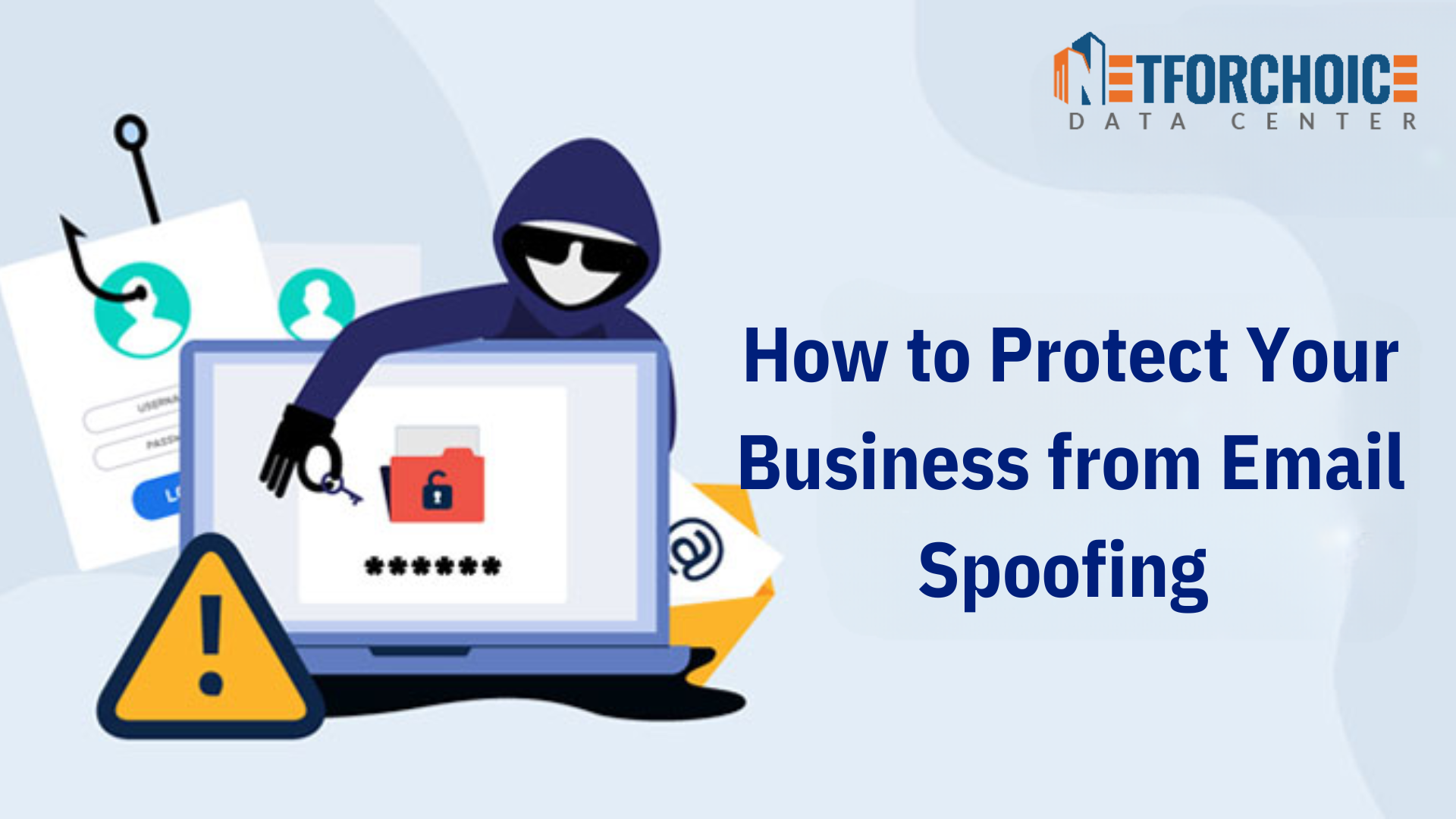Suppose you receive an email from your parent company asking for your company’s account number for the transfer of funds. The email address looks authorized, so you send the details—you realize later that you’ve fallen victim to an email spoofing attack. The sender wasn’t who they seemed to be; it was a hacker attempting to steal your data.
Email spoofing is an emerging cybersecurity threat that can result in financial loss, data breaches, and reputational damage. Thankfully, companies are implementing various measures to reduce these risks and protect their communication channels. In this blog, we’ll explore:
- What is Email Spoofing?
- Risks Associated with Email Spoofing
- Ways to Protect Your Business from Email Spoofing
- How NetForChoice Can Help Secure Your Business Emails
What is Email Spoofing?
Email spoofing is an unfair practice in which cybercriminals forge email headers to make messages appear as if they are sent from a trusted source. This misleading approach is mostly used in phishing attacks to trick victims into sharing private information, clicking on suspicious URLs, or even sending money. Recipients may find it difficult to distinguish between authentic and spoof emails since they frequently imitate well-known people or institutions. Attackers manipulate sender information to bypass traditional security measures, increasing the chances of a successful attack.
Risks of Falling Victim to Email Spoofing
Businesses face severe consequences when targeted by email spoofing attacks. Here are some key risks:
- Data breaches: Unauthorized access to confidential data can lead to financial losses and legal issues.
- Identity Theft: Attackers impersonate trusted individuals to steal personal or corporate information.
- Financial Fraud: Cybercriminals trick employees into wiring money to fraudulent accounts.
- Malware Infections: Spoofed emails often contain malicious attachments that install ransomware or spyware.
- Phishing Scams: Hackers deceive employees into divulging sensitive information such as login credentials.
- Reputation Damage: Customers and partners may lose trust in your business if they fall victim to spoofed emails appearing to come from you.
- Regulatory Violations: Failing to protect sensitive information can lead to non-compliance with data security regulations, resulting in penalties.
Ways to Protect Your Business from Email Spoofing
To prevent email spoofing, organizations must implement strong security measures and educate employees on cybersecurity best practices.
Deploy email authentication protocols:
- SPF (Sender Policy Framework): Specifies which IP addresses are authorized to send emails on behalf of your domain, reducing the chance of spoofed emails being delivered.
- DKIM (DomainKeys Identified Mail): Adds a digital signature to emails, allowing recipients to verify the sender’s authenticity and ensure the message hasn’t been altered.
- DMARC (Domain-based Message Authentication, Reporting, and Conformance): Builds on SPF and DKIM by providing instructions to receiving servers on how to handle emails that fail authentication, offering visibility into unauthorized use of your domain.
Educate employees on phishing threats:
- Regular Training: Conduct workshops to help staff recognize phishing attempts, understand the importance of verifying sender details, and avoid engaging with suspicious content.
- Simulated Phishing Exercises: Implement mock phishing campaigns to assess and improve employee vigilance and response strategies.
Utilize Advanced Security Solutions:
- AI-Powered Email Security: Leverage artificial intelligence to analyze email patterns and detect anomalies indicative of spoofing attempts.
- Real-Time Threat Intelligence: Integrate solutions that provide up-to-date information on emerging threats, enabling proactive defense measures.
Monitor and analyze email reports:
- DMARC Reports: Regularly review these reports to identify unauthorized email sources and adjust security policies accordingly.
- Security Information and Event Management (SIEM) Systems: Employ SIEM tools to aggregate and analyze log data for signs of suspicious email activity.
Implement Multi-Factor Authentication (MFA):
- Layered Security: Require users to provide multiple forms of verification, such as passwords combined with biometric data or one-time codes, to access email accounts, thereby reducing the risk of unauthorized access.
How NetForChoice Helps Protect Your Business Emails
NetForChoice offers a comprehensive suite of email security solutions to safeguard businesses from email spoofing, phishing, and other cyber threats. Our enterprise-grade email security services include:
- Advanced Email Filtering: Blocks malicious emails before they reach your inbox.
- SPF, DKIM, and DMARC Implementation: Ensures robust email authentication.
- AI-Powered Threat Detection: Identifies and neutralizes email-based attacks in real-time.
- 24/7 Security Monitoring: Continuous monitoring to detect and mitigate email threats.
- Employee Awareness Training: Educates staff on best practices to recognize and prevent phishing attacks.
By leveraging NetForChoice’s advanced email security solutions, businesses can significantly reduce the risk of email spoofing attacks and enhance their cybersecurity posture.
Final Thoughts
A serious cybersecurity risk that can result in financial losses, data breaches, and harm to one’s reputation is email spoofing. However, companies are able to reduce the risks associated with spoof emails by putting email authentication systems into place, educating employees, and utilizing advanced security solutions.
Advanced email security solutions from NetForChoice are meant to protect businesses from online risks. Get in touch with NetForChoice now to know more about our extensive email security services if you’re searching for a trusted method to protect your company’s communications.
Secure your business emails with NetForChoice—because cybersecurity starts with trusted communication.
